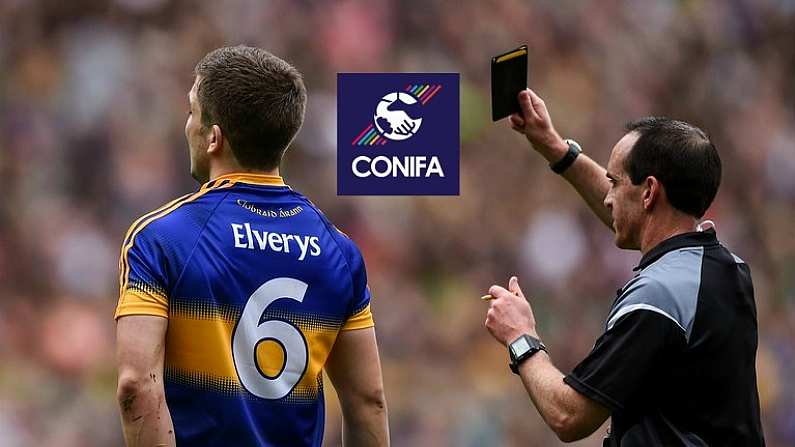World Cup fever is enveloping the sporting world this week, as the kick-off to the greatest football tournament on Earth happens this week, but there has also been a broad acknowledgement that it's just not the same as it used to be.
The globalisation of the game has eroded the mystique of it all, meaning there's no longer any surprises. The corruption scandals of recent years exposed some of the corruption within the games' govening body. And when FIFA isn't sending the showpiece competition to struggling economies such as South Africa and Brazil, they're hosting it in politically negligible states such as Russia and Qatar.
Unfortunately, there aren't many places to look elsewhere if you're trying to get away from the gross commercialism of the game, but there is one organisation doing their best to bring grassroots football to the international stage.
What Is CONIFA?
The Confederation of Independent Football Associations is a non-profit organisation that just staged its the third iteration of the World Football Cup in London.
As we explained in a piece last week, CONIFA "supports representatives of international football teams from nations, de-facto nations, regions, minority peoples and sports isolated territories." It's a terrific endeavour that deserves praise.
HIGHLIGHTS | Relive Karpatalya's dramatic @paddypower #WFC2018 World Football Cup final victory over Northern Cyprus thanks to @fc_video. pic.twitter.com/6yFvEk3yzW
— CONIFA (@CONIFAOfficial) June 10, 2018
Ahead of the tournament CONIFA introduced a third card for referees to brandish for disciplinary purposes. Inspired by the Black Card in Gaelic football, Irish readers will be well familiar with what the new 'Green Card' means, but it's still a new frontier for soccer. CONIFA General Secretary Sascha Düerkop explains to Balls why they chose to go ahead with the new rule.
Our referees and teams, but also fans of the beautiful game around the world, regularly criticise that football is becoming an increasingly "dirty game". In nearly every competitive match of football we can witness dives, players complaining and arguing, simulation, taking time and other behaviour of players that do not behave like sportsmen on the pitch. Such incidents do not only disturb the flow of the game significantly, they also frustrate fans, players and referees alike who, overwhelmingly, want to exercise the sport they love in a gentleman manner.
While the Black Card has come in for criticism since its implementation by the GAA, the major positive coming out of it has been the fact that it punishes the player more so than the team, who can simply substitute the punished player.
Most disappointing thing about the @CONIFAOfficial World Football Cup 2018, one thing that really made it a drag & frankly pretty much ruined it for me...........................................
NOT SEEING A GREEN CARD GIVEN!! #Gutted #CONIFA #WFC2018 #BeautifulGame15
— Two Men In Search Of The Beautiful Game (@BeautifulGame15) June 10, 2018
"Very often the team has no control over individual players that behave incorrectly," adds Sascha, who says the feedback they received on the Green Card was "overwhelmingly positive".
The referees, players, fans and media loved the idea of testing a new option for the referees. In fact, the green card could be considered a success so far, judging on the anecdotal feedback we do have at hand. We will go into a full evaluation over the next week and will then consider continuation or adjustment of the rules.
One imagines that evaluation will likely lead to the Green Card staying for the foreseeable future in CONIFA's rule book. Whether or not the International Football Association Board -- the independent guardian of the Laws of the Game -- follow suit is another matter, but they've started a conversation that perhaps needed to happen. The viewer's enjoyment of football is often curtailed by what we all refer to as the 'dark arts', but a third card could improve the sport.
In general, we also have the feeling that the flow of the game was improved and "dark arts" were significantly limited by the green card.
Sergio Ramos may not be a fan of it so, but then again he might have received far fewer red cards than the 24 that have been waved in his face during the course of his career.
There's a good chance that the Green Card would be gamed by professional players and managers, but there's always that risk with a new rule. In any case, CONIFA are looking forward to seeing if any major leagues decide to experiment with it and how football would adapt to it.
If this is the first you've heard of CONIFA, then you've just missed out on experiencing this year's World Football Cup, won by Karpatalya. But the competition received more attention than ever this year, with media entities such as the Guardian, Sky Sports, Al Jazeera and the New York Times covering it. Now is the time for the federation to build on the incredible momentum, as Sascha concludes:
We want to further build on the excitement and attention we got. We hope to make CONIFA more sustainable for the future and provide an ever-growing platform for our valued members. In order to do so, more continental cups and a World Football Cup outside of Europe are amongst the many plans we do have for the future.
Considering Yorkshire were recently admitted to CONIFA, perhaps in two years time we could see a Republic of Cork national side going for World Cup glory.
Watch: 8 Of The Greatest TV Moments From World Cups
In Pictures: The Day Ray Houghton Put The Ball In The English Net












